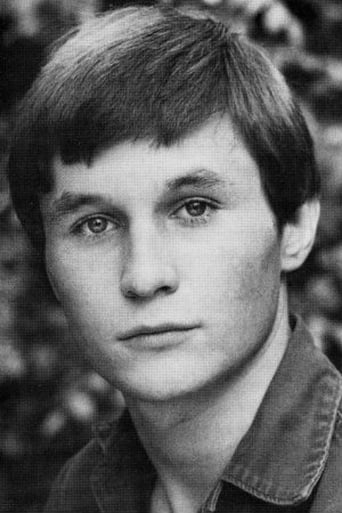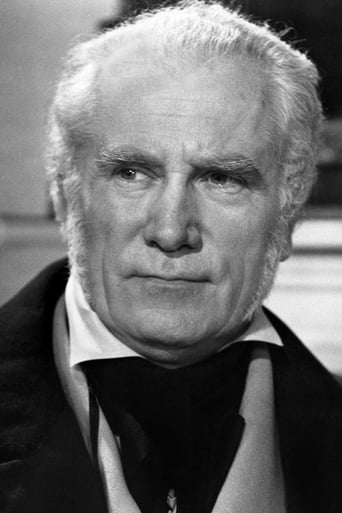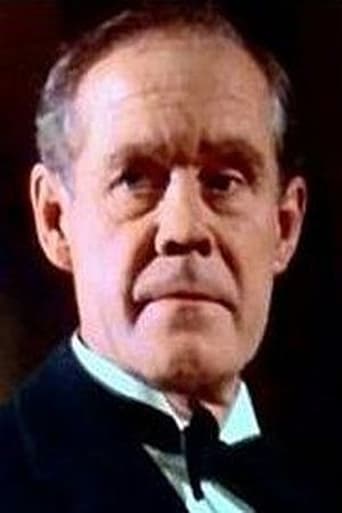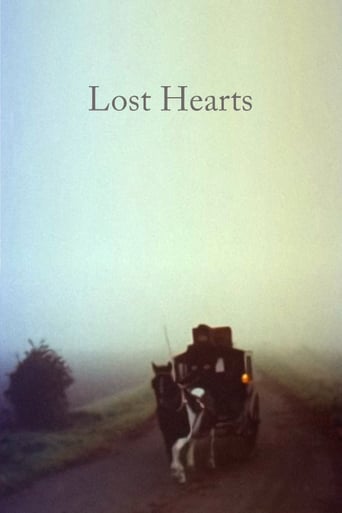
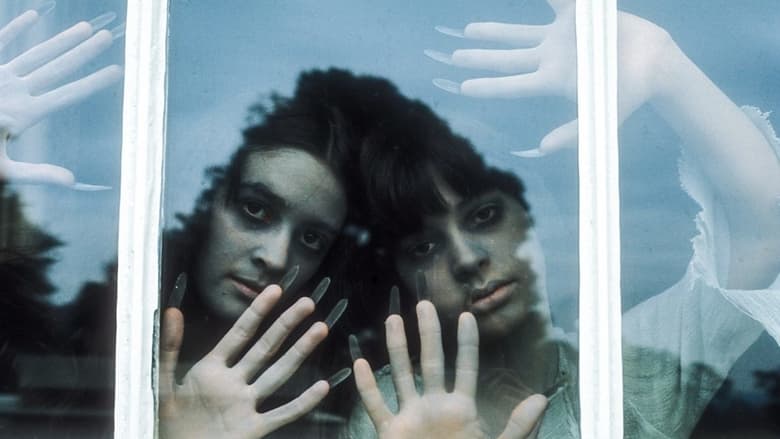
Lost Hearts (1973)
A young orphan, Stephen, is sent to go and live with his strange, much older cousin at his remote country house. Once there, Stephen experiences terrible dreams in which he sees a young girl and boy who are missing their hearts.
Watch Trailer
Cast
Reviews
If you don't like this, we can't be friends.
It's funny, it's tense, it features two great performances from two actors and the director expertly creates a web of odd tension where you actually don't know what is happening for the majority of the run time.
This is a coming of age storyline that you've seen in one form or another for decades. It takes a truly unique voice to make yet another one worth watching.
I didn’t really have many expectations going into the movie (good or bad), but I actually really enjoyed it. I really liked the characters and the banter between them.
I've only recently begun appreciating the works of M.R James and this BBC TV series is an ideal place to begin."Lost Hearts" is a gripping story that focuses on the somewhat eccentric and sinister activities of a boys cousin as the former is an orphan who has been sent to live at his cousin's country estate.I enjoyed this episode all the way through as each scene bears relevance to the plot.
Lawrence Gordon Clarke was behind the BBC's wonderful "Ghost Stories for Christmas," a series of creepy tales (most borrowed from the writings of M.R. James, though 'The Signalman (1976)' was a Dickens adaptation) to enjoy on a quiet, wintry Christmas night. 'Lost Hearts (1973)' is one of the lesser-known entries, but nonetheless proves a handsome ghost story with more chilling atmosphere in 35 minutes than most feature-length horror movies. Stephen (Simon Gipps-Kent) is a young orphan sent to live with Mr Abney (Joseph O'Connor), a kindly, doddering old scholar. From the moment he arrives, Stephen begins to see and hear apparitions of two children – a boy and girl of his age – whose intentions are obscure. Stephen comes to learn that the children are former orphans taken into Mr Abney's home.One thing Clarke does very well is create mood without even a hostile ghost ('The Sixth Sense (1999)' and 'The Others (2001)' would do this very well decades later). The two children, their faces pale and their fingernails talon-like, stand cross-armed outside the house, silent sentries; the boy plays an instrument called the hurdy-gurdy, and walks with an unsettling, lopsided toothy smile. Perhaps the film would have been even better had Clarke withheld the children's identity until the final act. By introducing the previous orphans – not just through dialogue, but images, as well – he humanises them, and their intentions immediately become less sinister. It would have been more effective, I think, if we didn't understand until the last moment that the ghosts were, in fact, trying to warn Stephen, not harm him.
After reading the 10 previous strongly positive reviews, I purchased this film on DVD. What a mistake! The plot was risible and the direction lame. The acting was pretty good, especially on the part of the two leads (too bad that Gipps-Kent died so young -- he was good enough that I wondered at first if the part was being played by a much more experienced woman). Nonetheless, the set-up (an innocent young orphan comes into the care of a kindly old bachelor) was followed by action that yielded not a particle of mystery, not a moment's frisson. The hackneyed denouement was so poorly executed as to leave me wondering what the other reviewers were thinking. They couldn't all be related to the cast or crew! Hope that other outings in the series are better-- I've now got several more to plow through. I'm a real fan of British TV and film, but this one isn't worth the heel of Mary Shelley's boot.
When M.R. James wrote LOST HEARTS in the late 1890s he little suspected that mainstream critics would intuit a dark undercurrent to this tale of occult sacrifice, yet BBC director Lawrence Gordon Clark shrewdly picked up on this subtle theme and brought it to the forefront of his 1973 adaptation of the story. Thus we have Mr Abney, an elderly and excitable black magician, preying sinisterly upon pubescent children in a manner which unpleasantly mirrors contemporary concerns over paedophilia. Mr Abney carefully selects vulnerable orphans for adoption. Once convinced that the children's disappearance will not be missed, he horribly murders them on the eve of their thirteenth birthdays, an age which historically associated with the maturation of the child. He lures them into his study, paralyses them with a drug, and then rips out their pulsating hearts from their live bodies. These he reduces to ashes which are then mixed with fine port wine and drank. Alas in Mr Abney's quest for immortal life occult wonders he finds himself subsequently haunted by the dead children, pallid creatures possessed of sinister talonesque fingernails and rent-open chests. Happily these creatures eventually exact a violent revenge upon their murderous adoptive parent.Lawrence Gordon Clark's adaptation of LOST HEARTS is perhaps his most powerful, partly because of this undeniably disturbing theme, partly because of his excellent direction. The opening scene which features a young boy arriving at Mr Anbey's manor house in a pony-and-trap through a haunting twilight mist perfectly evokes a lonely supernatural atmosphere. The spirits of the dead children are very frightening, and if in one or two scenes their acting appears slightly mechanical, the overall effect they create more than compensates for these minor defects. The action moves along briskly yet without appearing hurried. The central roles of Mr Abney and the young charge Stephen are played very well; Abney appears to bubble with an excitable Dickensian charm, yet under that energetic exterior a darker, predatory aspect is revealed. The ignorant working-class folk who run his ample home haven't the slightest knowledge about their master's obsessive interest in the black arts. Stephen is plausibly characterized, succeeding where many child actors may have failed. The scene in which he discovers a dead child's body in an old tin bath is truly harrowing.Clark clearly sensed a parallel with, or indeed an undercurrent of, paedophilia in James's original tale because he teases this theme out and expands upon it in his adaptation. The camera shots of Abney gloating over the boy are sinister. So might a spider regard a trapped fly. Clark adds one new scene which does not appear in the original story: a shot of a naked twelve year old girl in the bath, one of her breasts in side profile clearly displayed. Although James may have written in a pre-Freudian era, latter day critics and film-makers were perfectly capable of teasing out these subliminal themes from Victorian and Edwardian literature. Elsewhere Jonathan Miller had started the Jamesian ball rolling with his superb interpretation of WHISTLE AND I'LL COME TO YOU, portraying a repressed Professor as an emotionally retarded loner. Michael Reeves realistically portrayed the witch trials that swept across mainland Europe as cynical exercises in sadistic manipulation and avaricious profiteering in his critically acclaimed THE WITCHFINDER GENERAL. Clarke himself paid homage to this perspective in his BBC adaptation of M.R. James's THE ASH-TREE, depicting Mrs Mothersole as a sexually alluring woman branded a witch by men who lust after her in stark contrast to James's original, where the alleged witch was portrayed as a deserving victim. Clarke depicts Mothersole - buxom, bare-breasted and chained up in a dungeon - as a sexually alluring woman who only resorts to occult vengeance after being horribly abused herself, which is a realistic volte face of James's possibly chauvinistic original. And in SCHALKEN THE PAINTER, another ghost story adaptation from the 1970s, Clarke amplifies the undercurrent of sexuality that exists in the original Le Fanu tale in a very disturbing and effective manner. After all, Le Fanu did also author CARMILLA, one of the most overtly erotic Victorian ghost stories ever written.Clarke did not arbitrarily 'sex-up' any old BBC ghost story adaptation. There are no sexual overtones in his excellent versions of THE STALLS AT BARCHESTER, A WARNING TO THE CURIOUS nor THE SIGNALMAN. Clarke appears to have only amplified sexuality where it already existed as a theme or subconscious undercurrent. Indeed, one could even argue that James himself at some impossible-to-fathom level was aware of this concern about LOST HEARTS, hence his subsequent disregard for the tale subsequent to it's original publication in 1895.The BBC's adaptation of LOST HEARTS is one of the best ghost stories directed by Lawrence Gordon Clarke in the mid 1970s. It is faithful to the original and features many genuinely frightening scenes. Yet ironically the central theme of predation upon children, with its sly similie of paedophilia, a theme which imbues the tale with a dark and sinister edge, may have actually proved it's undoing because the BBC appears reluctant to repeat the film in the light of various child pornography scandals. Hopefully however the film will be released on DVD, or else repeated on TV with the benefit of a contextualizing introduction, because it would be a shame for an otherwise powerful drama to languish in the Beeb's vaults. LOST HEARTS poses unique political concerns and as such appears to present something of a problem to the television scheduler. It is every bit as effective as THE WICKERMAN but the child predation issue lends it a peculiarly discomforting air as elsewhere hangs over films such as STRAW DOGS or A CLOCKWORK ORANGE. However, because DVD pirates have already capitalized upon the pent-up demand for video copies of LOST HEARTS and THE ASHTREE by cobbling-together homemade versions to sell on Ebay, then the BBC would perhaps be wiser to satisfy this demand in some suitably responsible manner rather than ignore it.
